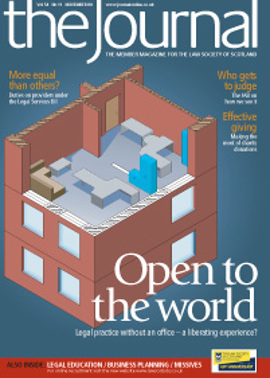Hear the grown-ups

In SK v Paterson [2009] CSIH 76 (2 October 2009), SK was the mother of a child born in 2006. SK had mild learning difficulties, though she was supported to live independently. In December 2006 a child protection order under s 57(2) of the Children (Scotland) Act 1995 was made, on the basis that there were reasonable grounds to believe that the child would be mistreated or come to serious harm if left in SK’s care. The child was placed with foster carers with SK being given regular, though regulated and supervised, contact.
At the initial hearings SK was represented by a solicitor, without legal aid; and subsequently only by a lay advocate and her father. In February 2008 she sought state funded legal representation, which was refused. She then lodged a devolution minute alleging, after amendment, that the absence of such representation at children’s hearings was a breach of articles 6, 8 and 14 of the European Convention.
Rights at issue
Although it was agreed that in general the article 6 rights are not necessarily breached if there is no access to state funded legal aid, SK argued that the Strasbourg court had considered cases of possible family separation to be as important as cases involving the deprivation of liberty. In the present circumstances, withholding assisted representation constituted a fundamental unfairness.
Subsequently the Scottish Ministers amended the Children’s Hearings (Legal Representation) (Scotland) Rules 2002 to allow state funded legal representation of certain individuals who would otherwise be unable to participate effectively in the process. This amendment was not uncontroversial: it was annulled by the Scottish Parliament’s Education, Lifelong Learning and Culture Committee, but subsequently reinstated by the full Parliament.
With regard to article 8 rights, SK contended that without adequate legal representation, full participation in a process that decided the makeup of a family was not possible. It was further contended, not without opposition, that the sheriff’s appellate role was circumscribed, in that a rehearing of the full facts was not possible, the question being whether the decision was justified in the circumstances. Indeed in S v Miller 2001 SC 977 the Lord President pointed out that it is perverse if a fair hearing is only possible at the appellate stage, rather than at the initial hearing which has the full capacity to consider all factors.
Under article 14 the state is required to apply Convention rights without discrimination, and states should treat persons in analogous situations equally unless there is reasonable justification why they should not. It was contended that SK’s learning disabilities put her into a situation analogous to that of a vulnerable child, which in line with S v Miller should be treated in the same way: that is, to be given full access to adequate representation. Failure by the state to make provision for the special treatment of adults with impairment or disability constituted discrimination contrary to article 14.
This must of course be balanced with the welfare of the child, which is the paramount consideration of the children’s hearing; though it is difficult to see how adequate legal representation of the adult can be to the detriment of the child.
Flawed system
The Inner House decided that if SK had not been able to participate effectively in the hearing of 6 February 2008, there would have been a breach of articles 6, 8 and 14 of her Convention rights. The issue was returned to the sheriff for consideration. With regard to article 6, the court commented that the absence of state funded representation for people not able to represent themselves effectively would be a systematic flaw of the legal aid scheme in relation to the children’s hearing system. The amended Children’s Hearings (Legal Representation) (Scotland) Rules set out to remedy this. Whether the amendment achieves its aims remains to be seen. The court declined to address the question whether the lack of any provision for legally aided representation before any children’s hearing would be a breach of SK’s Convention rights.
It is a dangerous route to assume that a disabled parent is by virtue of that disability a neglectful parent; or indeed to suppose that a family unit with adequate social work and other support is not better for a child than living with a non-disabled parent. But that is not the issue; the issue is whether the failure of the state to provide a forum where all parties can be adequately represented is a contravention of Convention rights.
Lee Jones, Scottish Human Rights Law Group
In this issue
- The equality, diversity and discrimination agenda: change and challenge ahead
- Justice on the green front
- Let the light in
- Needs of the family
- Reality on the West Bank
- Outside of the box
- Effective philanthropy
- Case for the defence
- Taking on the system
- Same rules for all?
- The benchmark
- Law reform update
- From the Brussels Office
- Appreciation: David Hector MacNeill
- Halfway to the Big Bang
- The same but different
- Five steps forward
- Ask Ash
- Preparing for disaster
- Rules a-changing
- Fair competition
- Time on whose side?
- 40 days and 40 nights
- Hear the grown-ups
- Problems of transition
- Scottish Solicitors' Discipline Tribunal
- Website review
- Book reviews
- Life on the other side
- Never waste a good crisis






